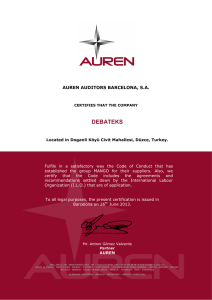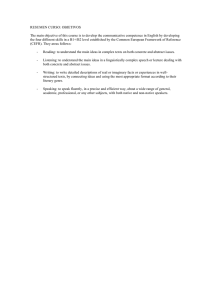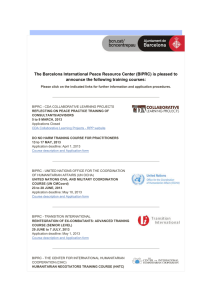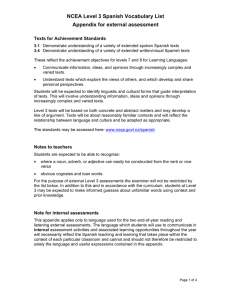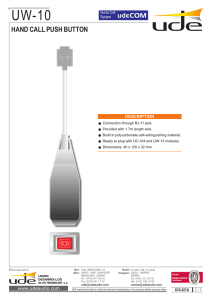Development of written expression 1
Anuncio
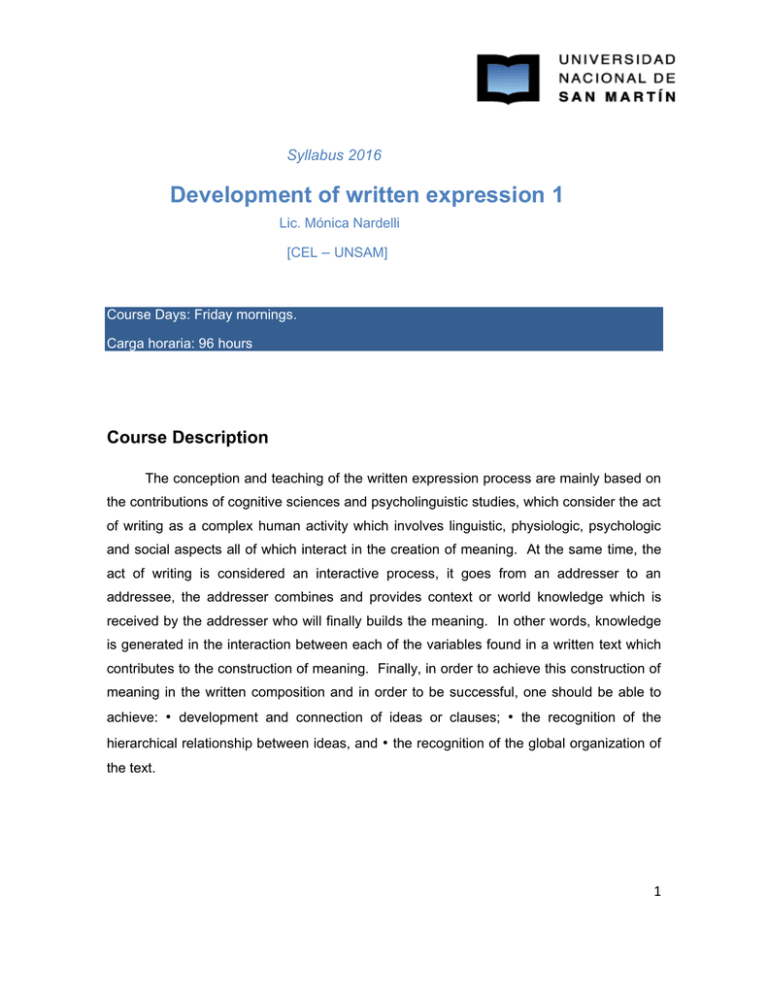
Syllabus 2016 Development of written expression 1 Lic. Mónica Nardelli [CEL – UNSAM] Course Days: Friday mornings. Carga horaria: 96 hours . Course Description The conception and teaching of the written expression process are mainly based on the contributions of cognitive sciences and psycholinguistic studies, which consider the act of writing as a complex human activity which involves linguistic, physiologic, psychologic and social aspects all of which interact in the creation of meaning. At the same time, the act of writing is considered an interactive process, it goes from an addresser to an addressee, the addresser combines and provides context or world knowledge which is received by the addresser who will finally builds the meaning. In other words, knowledge is generated in the interaction between each of the variables found in a written text which contributes to the construction of meaning. Finally, in order to achieve this construction of meaning in the written composition and in order to be successful, one should be able to achieve: • development and connection of ideas or clauses; • the recognition of the hierarchical relationship between ideas, and • the recognition of the global organization of the text. 1 Therefore, Development of written expression I stems from the concept that writing is a process with no definite element, on the contrary, it should be constantly exercised. In this process we begin with planning and this implies applying cognitive abilities such as analysis, deduction, synthesis, etc. Then, the ideas must be reflected in a process called composition and finally, there are two elements which need to be applied to the resulting text: proofreading and editing. In this course students will display their communicative competence in the written expression realm, but, at the same time, they will continue practicing the other linguistic skills, i.e.: oral production and written and oral comprehension which will be benefited by the writing practice. During this course, the students will develop the ability to write a variety of texts, from greeting messages to more formal texts of an informative nature. They will be capable of writing official, private, formal and informal texts applying the necessary stages of the writing process. This subject is part of the syllabus of the ‘Lengua y Literatura’ (Spanish and Literature) degree at Facultad de Ciencias de la Educación y Humanidades (School of Education and Humanities), Universidad Nacional Autónoma de Nicaragua (UNAN – León) (National University of Nicaragua). It is also part of the subjects offered by the STUDY ABROAD Centre which belongs to the Universidad Nacional de General San Martin, Argentina. Objectives The main goal of this course is that students become autonomous writers at a B2 level (CEFR) of Spanish as a foreign language and that they were able to apply this knowledge not only in their studies but in social contexts as well. Therefore, they must achieve the following specific objectives: a) To develop a high level of independence in the writing of different texts types. b) To learn about the different textual typologies. 2 c) To appropriately apply the rules of normative grammar in written compositions d) To apply written composition strategies efficiently (the text addressee characteristics, the message intention, its content and the written channel will be taken into account). e) To employ cohesion and coherent concepts in the composition of any text. f) To simultaneously strengthen the other linguistic skills: reading comprehension, listening comprehension and oral expression which will provide the students more knowledge about a topic and will let them convey their ideas in a written manner in the best possible way. REQUIRED TEXTBOOKS FOR THE TEACHER Cassany, Daniel, La cocina de la escritura, Barcelona, Editorial Anagrama, 2000. ISBN 84-339-1392-1 Cassany, Daniel, Reparar la escritura. Didáctica de la corrección de lo escrito, Barcelona, Editorial Graó, 1998. ISBN: 84-7827-050-7 Cassany, Daniel, Describir el escribir, Barcelona, Empúres, 1987. Cohen, Sandro, Redacción sin dolor, aprenda a escribir con claridad y precisión, México, Ed. Planeta Mexicana, 2004. . ISBN 9706908692 Creme, Phyllis & Lea, Mary R., Escribir en la universidad, Barcelona, Editorial Gedisa, 2000. ISBN 84-7432-698-2 Nueva Gramática de la Lengua Española, Madrid, Espasa, Libros, 1999. Ortega, W., Redacción y composición. Técnicas prácticas, México, McGraw Hill, 1992. Rojas Soriano, Raúl, El arte de hablar y escribir, experiencias y recomendaciones, México, Editorial Plaza y Valdés, 2002. ISBN 968-856-892-9 Sefarini, M., Cómo redactar un tema, Barcelona, Paidós, 1989. Serafina, M.T., Cómo se escribe, Barcelona, Paidós, 1994. 3 Textos académicos, Universidad Pompeu Fabra, Barcelona. Extraído de http://parles.upf.edu/llocs/cr/casacd/index.html REQUIRED TEXTBOOKS FOR THE STUDENT - Study Material prepared by the academic coordinators from Argentina and Nicaragua. - Nueva Gramática de la Lengua Española, Madrid, Espasa, Libros,1999. CONTENTS & COURSE CALENDAR This calendar could be subject to modifications. The teacher will announce in class any change necessary changes. WEEK 1: Human communication: the addresser-addressee model; intent of the message; context and background knowledge. The written channel: different means/resources. READINGS For the student: Texts and practice of Unit 1 of the Development of Written Expression I class booklet. For the teacher: Cassany, Daniel, La cocina de la escritura, Barcelona, Editorial Anagrama, 2000. ISBN 84-339-1392-1 WEEK 2: Composition Process: We will approach this process in a practical way, learning about the necessary elements to delineate a written piece (brainstorming, order of ideas, sketches), how to write a composition, proofreading and editing the text. READINGS For the student: Texts and practice of Unit 2 of the Development of Written Expression I class booklet. For the teacher: Cassany, Daniel, Describir el escribir, Barcelona, Empúres, 1987. Ortega, W., Redacción y composición. Técnicas prácticas, México, McGraw Hill, 1992. 4 Week 3: Connectives. Types of connectives: addition (also, likewise, furthermore, etc.), result (therefore, for that reason, etc.), order (in the first place, in the second place), summary (in synthesis, to sum it up, to sum up, in few words, etc.). READINGS For the student: Texts and practice of Unit 3 of the Development of Written Expression I class booklet and Nueva Gramática de la Lengua Española, Madrid, Espasa, Libros, 1999. For the teacher: Nueva Gramática de la Lengua Española, Madrid, Espasa, Libros, 1999. WEEK 4: Vices of Language: incorrect usage of "de que" or "que.", tautology, cacophony, ambiguity, etc. READINGS For the student: Texts and practice of Unit 4 of the Development of Written Expression I class booklet and Nueva Gramática de la Lengua Española, Madrid, Espasa, Libros, 1999. For the teacher: Cassany, Daniel, Reparar la escritura. Didáctica de la corrección de lo escrito, Barcelona, Editorial Graó, 1998. ISBN: 84-7827-050-7 5 WEEK 5: Text typologies: non-literary texts: expository, advertising, informative, instructional and argumentative. This course will make emphasize on expository, informative and advertising texts. Exercises: composition of formal and informal letters, e-mails, reports, brochures, fliers, power points for academic or business presentations. READINGS For the student: Texts and practice of Unit 5 of the Development of Written Expression I class booklet. For the teacher: Creme, Phyllis & LEA, Mary R., Escribir en la universidad, Barcelona, Editorial Gedisa, 2000. ISBN 84-7432-698-2 WEEK 6: Orthography: spelling, punctuation marks and accents. The teacher will give the instructions for the Term Written Assignment. READINGS For the student: Texts and practice of Unit 6 of the Development of Written Expression I class booklet and Nueva Gramática de la Lengua Española, Madrid, Espasa, Libros, 1999. For the teacher: Serafina, M.T. , Cómo se escribe, Barcelona, Paidós, 1994. WEEKS 7 and 8: Preparation of the Term Written Assignment. WEEK 9: Return of the Term Written Assignments, idea-sharing session. 6 WEEK 10: Cohesion in expository, informative and advertising texts. READINGS For the student: Texts and practice of Unit 7 of the Development of Written Expression I class booklet. For the teacher: Sefarini, M., Cómo redactar un tema, Barcelona, Paidós, 1989. WEEK 11: Coherence in expository, informative and advertising texts. READINGS For the student: Texts and practice of Unit 8 of the Development of Written Expression I class booklet. For the teacher: Academic texts. Universidad Pompeu Fabra. Barcelona. Extraído de http://parles.upf.edu/llocs/cr/casacd/index.html WEEK 12: Composition practice with emphasis on coherence and cohesion concepts. WEEK 13: Preparation Outline for the term final assignment, idea-sharing session. 7 Evaluation & Grading Policy A) Evaluation Criteria and requirements: Students must read the required readings and complete the established assignments for each class. There will be a mid-term written assignment which should be passed before the end of the course The course grade consists of -15% class participation; - 15% homework; - 30% written assignment; - 40% final exam B) Attendance Policy: It will be required an 80% class attendance, the student who does not meet that percentage will automatically receive an “F”. In this class, 0.5 points will be deducted from your Attendance grade for every unexcused absence or if the student does hand in the compulsory written assignment in due time and proper course or any other task given by the teacher. Missed Exams: “Make-up” exams are a privilege, one to be extended only to students who have missed an exam with prior arrangement (one week notice) with the instructor or due to extenuating circumstances. Participation: We attach great importance to participation as a learning experience. A student´s grade will suffer changes because of actions which might disrupt the group experience. For this reason all cell phones must be turned off before the class begins. If you have a unique circumstance for which you must leave the phone on, consent from the instructor is required beforehand. Students will have a significant point total deducted from their class grade if they do not adhere to this regulation. 8 C) Grading Scale Description 10 (A) Excellent 9 (A-) Very Good 8 (B) Good 7 (B-) Above Average 6 (C) 5 (C) 4 (D) Average Below Average Lowest Passing Grade F W I Failure Officially withdrawn Incomplete Percentage 100-95 94-89 88-83 82-77 76-71 70-65 64-60 59-0 Academic Advisor’s approval Academic Advisor’s approval Plagiarism: An important objective of this course is to get students to learn how to write expository, informative and advertising texts. Therefore, students are expected to write their own work. Plagiarism not only undermines this learning process but also represents a serious breach of College policy and of academic honesty. Outside sources should always be referenced in the essay’s bibliography. Plagiarized work will receive an automatic F. If you have any doubts on what constitutes plagiarism, do not hesitate to ask the Instructor. 9
